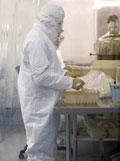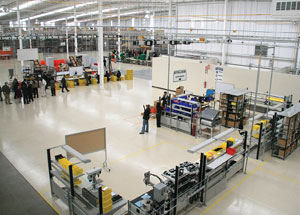
Digital Media Find Fertile Ground in Connecticut, Chicago and Canada


reating 73 new jobs, Canadian bio-pharma company Bioniche Life Sciences plans to scale up vaccine production at its Belleville, Ont., headquarters, manufacturing and R&D complex over the next two years to provide capacity of 40 million doses of the E. coli O157:H7 vaccine – the world’s first and only cattle vaccine that may be used as an on-farm intervention. The scale-up is expected to cost approximately C$25 million, and is part of a long-term, C$100-million project to create an Animal Health and Food Safety Vaccine Manufacturing Center.
Within the span of three days in December, Bioniche announced C$10 million in support from the Ontario Ministry of Economic Development and Trade Advanced Manufacturing Investment Strategy and $5 million in repayable federal funds from the new Agri-Opportunities Program of Canada’s Department of Agriculture and Agri-Food.
Jennifer Shea, corporate communications and investor relations manager for Bioniche, says the company moved into its Belleville home, where some buildings date to the 1920s, in 2000, and now occupies 140,000 sq. ft. (13,006 sq. m.) on eight acres (3.2 hectares). She says both the initial and long-term expansions are slated to occur on that parcel.
“In the process of looking at this whole expansion, we looked at other possibilities, including U.S. jurisdictions which had existing facilities that were vacant, or technoparks,” she says. “Our preference is to have as many of our facilities together as we can. Given that this is corporate headquarters and that half of our total global work force is at this site, it was best to locate here,” she says, citing the government support as a major enabler. Bioniche is the first firm to take advantage of the new federal program.
Bioniche’s reach is Canada-wide and worldwide. Its business encompasses a human health arm, currently pursuing a bladder cancer treatment in phase three of development, which has its chief manufacturing base in Pointe-Claire, Québec. The animal health side is the revenue arm, generating about $27 million annually, producing livestock reproduction products in Belleville; Pullman, Wash.; and Armidale, Australia, and immunotherapeutic products in Athens, Ga.
The E. coli vaccine has been developed via an alliance formed in 2000 among the University of British Columbia, the Alberta Research Council, the University of Saskatchewan’s Vaccine & Infectious Disease Organization and Bioniche.
A month after the funding announcements, further news came to light that may affect Bioniche’s business case: According to The Des Moines Register, two university studies suggest that distillers grains fed to cattle may increase levels of E. coli bacteria in their systems. Distillers grains are a popular feed byproduct of the booming ethanol business, often selling for more than 25 percent less than the increasingly expensive corn that is the ethanol industry’s primary feedstock.

ittsburgh-based safety product manufacturer MSA marked 50 years in Mexico by cutting the ribbon on a new 77,000-sq.-ft. (7,153-sq.-m.) manufacturing facility in Querétaro, Mexico.
Located 135 miles (217 km.) northwest of Mexico City, the plant will initially employ about 85, with employment expected to increase to about 170 throughout 2008 as the company consolidates operations from previous locations in Mexico City and Torréon.
The plant will serve as a key manufacturing site for several MSA products, including head protection products, fall protection equipment and instrumentation. The plant’s products will be used largely by workers in the construction, offshore gas and petrochemical industries. MSA employs approximately 4,500 people at more than 40 locations on five continents, with annual sales of $950 million.
The facility is a key part of MSA’s Project Magellan, an effort to improve North American manufacturing efficiency that is projected to save the company as much as $10 million in the next three to five years.

fter Connecticut legislators went back to the editing room in 2007, their efforts attracted a blockbuster in 2008.
Blue Sky Studios, the digital animation subsidiary of Fox Filmed Entertainment that produced the hit Ice Age movies, is inserting 300 very real jobs into the economy of Greenwich, relocating to 106,000 sq. ft. (9,847 sq. m.) on one floor in the Greenwich American Centre from multiple, separated floors at its former location just across the state line in White Plains, N.Y.
The 590,000 sq.-ft. (54,811-sq.-m.) facility near Westchester Airport is known as a home to several hedge-fund firms, led by Amaranth Advisors. Located about an hour’s commute from midtown Manhattan, it was purchased in 2005 by Tishman Speyer Properties, as part of a portfolio of buildings across the country it acquired from the Singapore government’s real estate arm, GIC Real Estate.
“The state has taken the lead to create the necessary economic environment to make itself attractive to businesses like ours,” said Blue Sky CFO/COO Brian Keane. “Blue Sky expects to relocate all of its employees late in calendar 2008 after renovations have been completed.”
A US$8-million low-interest loan from the state will help pay for those renovations and some equipment. But just as important to the choice was a legislative measure in 2007 that expanded a 2006 tax credit program for film, TV and Web production to include investments in building and other infrastructure. Production companies are eligible for tax credits of up to 30 percent on production expenses or costs incurred within the state.
The digital media industry – from animation to simulation to navigation – is in full growth mode. Among projects tracked in the past two years by the Conway Data New Plant Database have been multiple modeling and simulation operations in the Hampton Roads area of Virginia; a $2-million expansion by media and film production company DNP Productions in the simulation hub of Orlando; a 350-employee headquarters expansion by digital mapping king Navteq in Chicago and a new private digital media arts institute, Flashpoint Academy, established in Chicago with a $3-million facility investment in 2007.
Canada too has its share of digital media activity, with Montréal-based Ubisoft leading all comers with its C$457-million headquarters and production expansion announced in early 2007.
In September, British Columbia Premier Gordon Campbell opened the new Centre for Digital Media at the Great Northern Way Campus in Vancouver, simultaneously announcing the nation’s first Master’s Degree in Digital Media. Funded by C$40.5 million in provincial funding, the center’s efforts will build on a digital media economy in B.C. that boasts more than 1,000 companies, 156 in videogame development alone.
The world market is expected to grow from about US$28 billion in 2005 to approximately $42 billion in 2010.
Site Selection Online – The magazine of Corporate Real Estate Strategy and Area Economic Development.
©2008 Conway Data, Inc. All rights reserved. SiteNet data is from many sources and not warranted to be accurate or current.